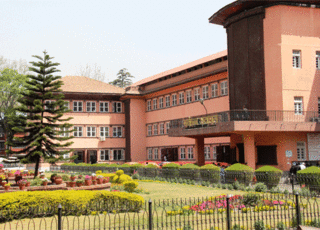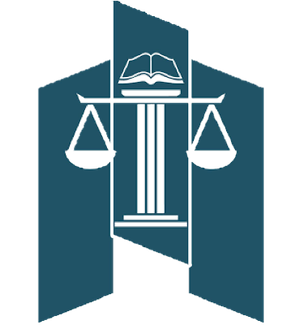Related Research Articles

The politics of Eritrea and the government of Eritrea take place in the framework of a single-party presidential republican totalitarian dictatorship. The President officially serves as both head of state and head of government. The People's Front for Democracy and Justice is the only political party legally permitted to exist in Eritrea. The popularly elected National Assembly of 150 seats, formed in 1993 shortly after independence from Ethiopia, elected the current president, Isaias Afwerki. There have been no general elections since its official independence in 1993. A new constitution was drafted in 1993 and ratified in 1997, but has not been implemented. Since the National Assembly last met in January 2002, president Afwerki has exercised the powers of both the executive and legislative branches of government.

The Judicial Yuan is the judicial branch of the government of Taiwan. It runs a Constitutional Court and oversees all systems of courts of Taiwan, including ordinary courts like the supreme court, high courts, district courts as well as special courts like administrative courts and disciplinary courts. By Taiwanese law, the Judicial Yuan holds the following powers:
The court system of Canada is made up of many courts differing in levels of legal superiority and separated by jurisdiction. In the courts, the judiciary interpret and apply the law of Canada. Some of the courts are federal in nature, while others are provincial or territorial.
An administrative law judge (ALJ) in the United States is a judge and trier of fact who both presides over trials and adjudicates claims or disputes involving administrative law. ALJs can administer oaths, take testimony, rule on questions of evidence, and make factual and legal determinations.
The federal judiciary of the United States is one of the three branches of the federal government of the United States organized under the United States Constitution and laws of the federal government. The U.S. federal judiciary consists primarily of the U.S. Supreme Court, the U.S. Courts of Appeals, and the U.S. District Courts. It also includes a variety of other lesser federal tribunals.

The Supreme Court of Japan, located in Hayabusachō, Chiyoda, Tokyo, is the highest court in Japan. It has ultimate judicial authority to interpret the Japanese constitution and decide questions of national law. It has the power of judicial review, which allows it to determine the constitutionality of any law or official act.

The Supreme Court of Nepal is the highest court in Nepal. It is designated as the court of record by the Constitution of Nepal. It has appellate jurisdiction over decisions of the seven High Courts and extraordinary original jurisdiction. The court consists of twenty judges and a Chief Justice.

The judicial branch, organized under the constitution and organic law, is one of five organs of state power elected by the National People's Congress (NPC), in the People's Republic of China. China does not have judicial independence or judicial review as the courts do not have authority beyond what is granted to them by the NPC under a system of unified power. The Chinese Communist Party's Central Political and Legal Affairs Commission maintains effective control over the court system and its personnel. Hong Kong and Macau have separate court systems in accordance with the "one country, two systems" doctrine.

The Constitution of the Federal Democratic Republic of Ethiopia, also known as the 1995 Constitution of Ethiopia, is the supreme law of Ethiopia. The constitution came into force on 21 August 1995 after it was drawn up by the Constituent Assembly that was elected in June 1994. It was adopted by the Transitional Government of Ethiopia on 8 December 1994 and came into force following the general election held in May–June 1995.

S. R. Bommai v. Union of India is a landmark decision of the Supreme Court of India, where the Court discussed at length provisions of Article 356 of the Constitution of India and related issues. This case had huge impact on Centre-State Relations. The judgement attempted to curb blatant misuse of Article 356 of the Constitution of India, which allowed President's rule to be imposed over state governments. S. R. Bommai, former Chief Minister of Karnataka, is widely remembered as the champion for this landmark judgment of the Supreme Court of India, considered one of the most quoted verdicts in the country's political history.

The Federal Supreme Court of Ethiopia is the highest court in Ethiopia. It was established by the Federal Democratic Republic of Ethiopia constitution in 1994 and is currently located in Addis Ababa. Article 78 of the Constitution establishes the judiciary and at the top is the FSC. By the Constitution, the Federal Supreme Court has "the power of cassation over any final court decision containing a basic error of law". In 2018, Prime Minister Abiy Ahmed appointed Meaza Ashenafi to be the first female president of the Federal Supreme Court. Solomon Areda Waktolla was appointed as Vice President of the Federal Supreme Court. Both were resigned by the Parliament on 17 January 2023, and replaced by Tewodros Mihret and Abeba Embiale as Chief Justice and Deputy Chief Justice of the Supreme Court respectively.

The legal systems of Eritrea go as far back as the 14th century. Before independence, Eritrea was colonized by Italy and later occupied by Britain, therefore subjugated to those nations' laws through the World War II era. In the 1950s, the United Nations gave neighboring Ethiopia power and responsibility for Eritrea, and thus its legal system mirrored that of Ethiopia. After gaining its independence in 1993, Eritrea began to draft its own constitution, which was implemented in 1997. Much of Eritrea's judicial system is spelled out in this Constitution. However, even today, customary law has remained the most prevalent law in the lives of most Eritreans.

The judiciary of South Korea is the judicial branch (사법부) of South Korean central government, established by Chapter 5 and 6 of the Constitution of South Korea.

Since the new constitution of Ethiopia enacted in 1995, Ethiopia's legal system consisted of federal law with bicameral legislature. The House of People's Representatives (HoPR) is the lower chamber of bicameral legislature of Federal Parliamentary Assembly with 547 seats and the House of Federation with 108 seats, the former vested on executive power of Prime Minister and the Council of Ministers, and the latter have authority to interpret federal law and oversees regional and federal decisions.

The judiciary of Ethiopia consists of dual system with parallel court structures: the federal and state courts having independent administration. The FDRE Constitution vested federal authority to the Federal Supreme Court which is cassation division and presides determining and overturning decisions made by the lower federal courts with itself has regular division assigned to review fundamental errors of law. Article 3, 4 and 5 stipulates the governance of federal courts over national and international aspects.

Courts in Ethiopia divided into three-level structures: the State Supreme Court, High Courts and the First Instance Courts. State Courts are represented in every regions of Ethiopia and have seat in each capital cities. The FDRE Constitution provides judicial review to the Federal Supreme Court, delegated by State Supreme Court, Federal High Courts and Federal First Instance Courts respectively.

The Federal First Instance Court is the first-level court division in Ethiopia. The FDRE Constitution delegates judicial jurisdiction to the First Instance Court, along with the High Court and State Courts. It is headquartered in Addis Ababa in Kirkos district, with expectations of expanding new branches in all districts of Addis Ababa.

The Federal High Court of Ethiopia is the second-level court division in Ethiopia. The FDRE Constitution delegates judicial jurisdiction to the Federal High Court, along with the First Instance and State Courts. It has its headquarters in Addis Ababa's Lideta district.
The Ethiopian Criminal Code is the criminal code of Ethiopia. Stemmed from the 1957 Penal Code of the Ethiopian Empire, the FDRE regime repealed both the Ethiopian Empire and the Derg revised Proclamation in 1982 from 9 May 2005 and has 865 Articles. Furthermore, the Code obligated to ensure order, peace and security of the country, its people, and inhabitants for the public good.
The Oromia Supreme Court is the Ethiopian Federal Supreme Court department based in Oromia Region. Under Proclamation No 46/2001, Article 65(1–2), the Supreme Court alongside other regional counterparts should obligated to the Federal and regional government of Ethiopia, and judges can be appointed by the Regional Judicial Commission and the nominees submitted to Regional Council for appointment by the President of the Supreme Court.
References
- ↑ "Ethiopia - Federal Judicial Administration Commission Establishment Proclamation (No. 24 of 1996)". www.ilo.org. Retrieved 2022-07-26.
- ↑ "Judicial Performance Evaluation in Ethiopia: Local Reforms Meet Global Challenges" (PDF). 26 July 2022.
- ↑ "Federal Judicial Administration Proclamation No. 1233-2021Ethiopian Legal Brief". Ethiopian Legal Brief. 2021-07-09. Archived from the original on 2022-07-26. Retrieved 2022-07-26.
{{cite web}}: CS1 maint: unfit URL (link) - ↑ "FEDERAL NEGARIT GAZETTE OF THE FEDERAL DEMOCRATIC REPUBLIC OF ETHIOPIA" (PDF). 26 July 2022. Archived from the original on 18 October 2021. Retrieved 26 July 2022.
{{cite web}}: CS1 maint: unfit URL (link) - ↑ "Judicial Power Decentralization in Ethiopia:Practical Limitations and Implications on Selfgovernance of Regional States". 26 July 2022. p. 4.